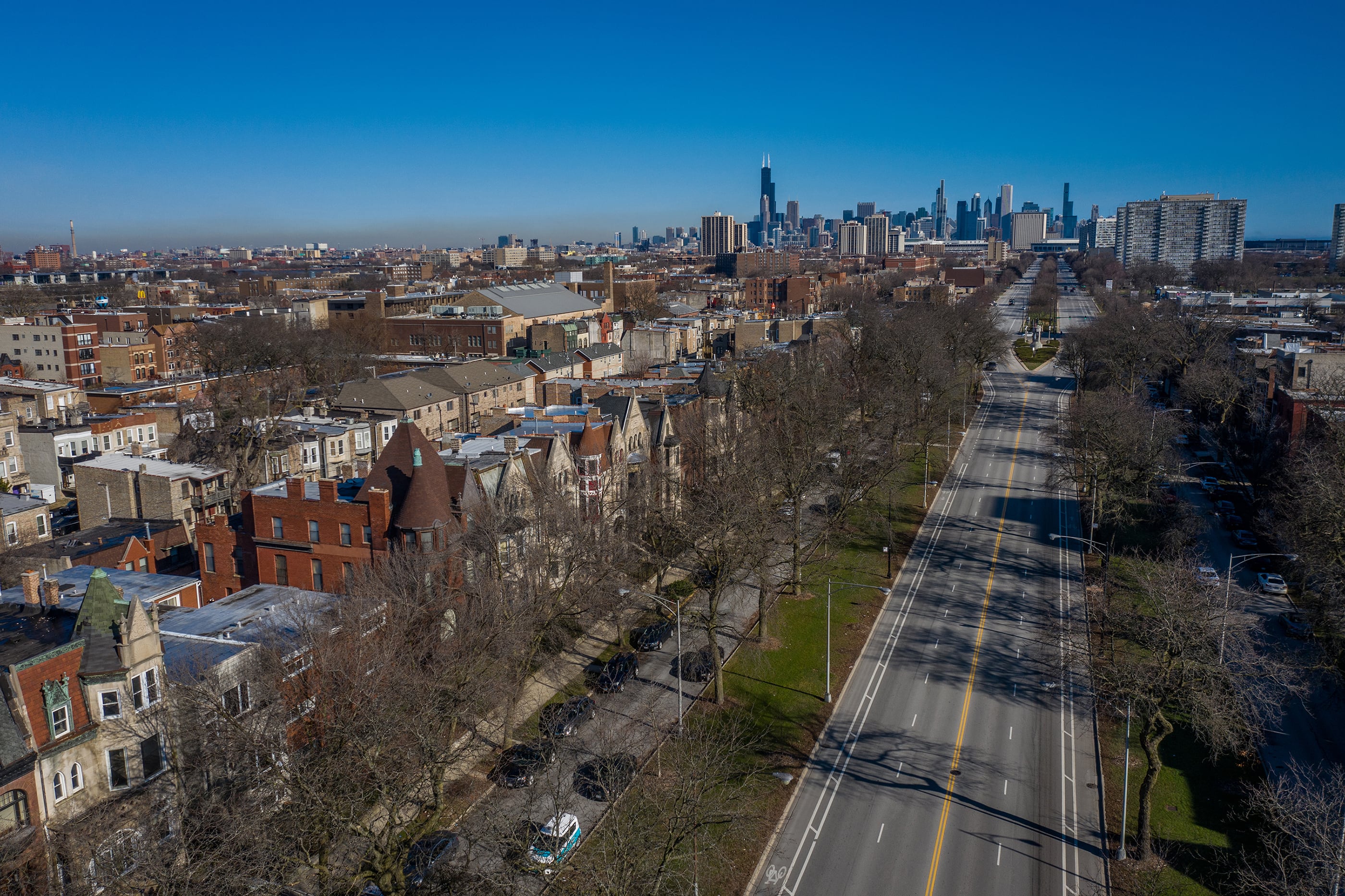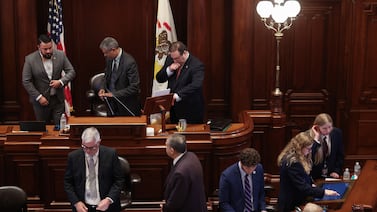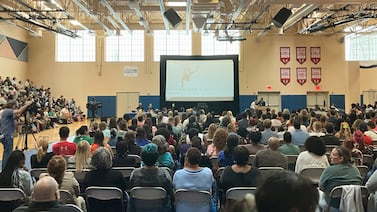Sign up for Chalkbeat Chicago’s free daily newsletter to keep up with the latest education news.
In the eight months since Chicago’s partially elected, partially appointed school board was seated, many of its members have had to exercise a muscle their predecessors weren’t required to flex: Figuring out what the public wants.
The 21-member Chicago Board of Education has already navigated most of the core functions of a school board, including picking an interim leader, approving the Chicago Teachers Union contract, balancing a budget with a $734 million deficit and grappling with the hotly protested proposed closure of seven charter schools. The board members have worked through these issues while wrestling with time constraints, internal politics, and external pressure that hasn’t existed before, according to interviews with 15 current and one former board member.
Take, for instance, Ebony DeBerry’s journey from community activist to elected school board member. After easily winning the race to represent a diverse, progressive pocket of the North Side with the backing of the Chicago Teachers Union, DeBerry faced a pivotal vote on Chicago Public Schools’ $10.2 billion budget proposal.
The budget plan had drawn opposition from the CTU and Mayor Brandon Johnson because it didn’t include a pension reimbursement to the city and a loan. DeBerry ultimately split with her allies and cast a vote in favor of the proposal, despite her own “strong distaste” for some of the district’s calculations, she said.
She did so because she wanted to listen to the people she represents, DeBerry said.
“It just keeps coming back to the constituents,” DeBerry told Chalkbeat the week before the vote. “That’s what I would love to do as an elected official: Do as I’m asked.”
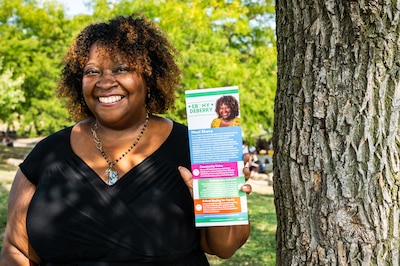
Previous Chicago school board members appointed by the mayor mostly did as the mayor asked. But now, school board members must consider what the broader public wants to see in schools, especially those who want to keep their seats through the next election in November 2026, when all 21 members will be chosen by voters.
The way board members navigate these major decisions and the political divide on the body provides a window into how this experiment in Chicago democracy is going so far — and how it could impact policymaking for the nation’s fourth largest school district for years to come.
Chicago school board members are unpaid
The 21 people leading Chicago’s transition to an elected school board are doing so on a volunteer basis. They’re working without pay and clocking at least an average of 25 hours a week, according to school board members interviewed by Chalkbeat.
Some are juggling the role with full-time jobs, and others have quit their day jobs. They go on school visits, host office hours, attend meetings, take phone calls, and read materials that are supposed to inform their votes, which multiple board members described as detailed and lengthy.
Chicago Board of Education President Sean Harden, a mayoral appointee who also runs a consulting firm, said he spends an unlimited amount of time on board business. His responsibilities also include communicating with board members and keeping in touch with the mayor’s office.
“It really never turns off,” he said. “It’s a Monday through Sunday scenario.”
Elected board member Jennifer Custer, a mom of three, including one under the age of 1, said she has a supportive husband and community of relatives and friends who can help with child care in a pinch. But her responsibilities at home mean she can’t make every obligation and often must get creative.
“Sometimes I take my kids with me to school visits, and schools are very welcoming and very warming to that when I have no other option,” Custer said. “I take my daughter to the board office all the time. You do what you have to do to do the work.”
Elected board member Yesenia Lopez and appointed board member Norma Rios-Sierra both said they quit their full-time jobs in order to have more flexible schedules to serve on the board. Rios-Sierra, a single mom, is earning some money through freelance artwork; Lopez said she will probably need to find another, more flexible job soon.
Angel Gutierrez, an elected member who works full-time, said he wishes he could hold town halls like other legislators, but “I have bills that I pay at home, I have a family to support.”
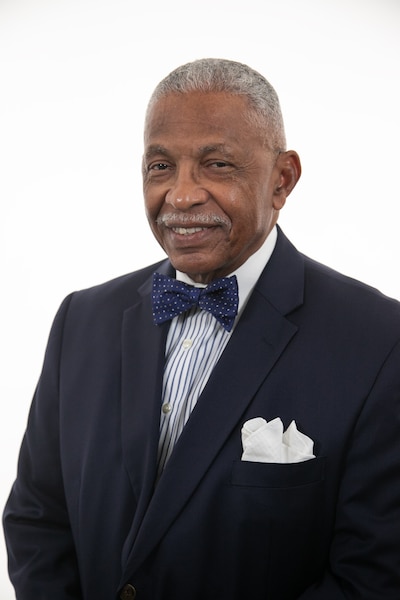
Frank Niles Thomas was retired when he was appointed to the board last fall after the mass resignation of the mayor’s first appointed board. Thomas converted his dining room table at his South Side home into his office, and his days filled up with phone calls, answering emails, reading documents, and attending meetings.
Thomas loved serving on the board, he said, but he needed to earn money to support a relative in need.
”You got to have income to deal with it — and I didn’t,” Thomas said, who resigned in June.
Illinois law prohibits paying school board members beyond reasonable reimbursements related to their role. A push to provide pay for Chicago’s new board has so far been unsuccessful in Springfield.
“When we first fought for the elected school board, we definitely were talking about compensation, because we view it as an obstacle to parents if they couldn’t have this be their job,” said appointed board member Karen Zaccor, a retired teacher who was part of the decades-long effort to create an elected board. “That really is asking a lot.”
Factions and alliances emerge in key Chicago school board votes
In addition to the time demands, trying to bridge the board’s political divide can cause a level of “emotional pressure” that elected board member Jessica Biggs said she did not anticipate.
“The stakes are really high,” Biggs said. “Where I thought that there would be some more consensus around things that I see as sort of obviously in the best interests of kids, schools, and the system, everybody else doesn’t see it that way all the time or there are competing interests at play.”
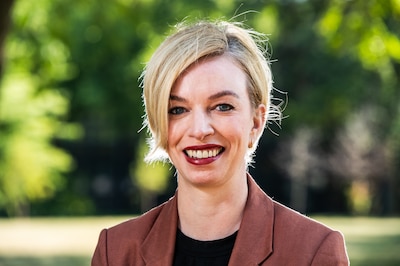
Divisions on school boards are nothing new, but public debate and disagreement is unfamiliar when it comes to school governance in Chicago.
From 1995 through 2024, Chicago’s mayors picked people to serve on the city’s school board. By design, board members were aligned with City Hall and were often criticized for being rubber stamps for the mayor, who earned the credit or backlash for the state of the public school system.
That’s partly why observers of the school system were stunned when Johnson’s entire first appointed school board stepped down over disagreements with his office in October 2024, just three months before the new 21-member board was seated.
Several of the newly appointed members stayed on when the new board was sworn in this past January and tensions carried over. Five appointees who remained had voted in late December to fire former CPS CEO Pedro Martinez, who had sued those board members and would stay in his job for another six months. But many newly elected board members opposed Martinez’s firing.
Together, they faced an onslaught of problems that are at the heart of a school board’s responsibilities: the decision on who would replace Martinez, souring negotiations over the Chicago Teachers Union contract, and the planned closure of seven charter schools run by Acero, which the CTU, staff, and families protested for months.
In interviews for this story, several board members cited their decision in February to save five of the Acero schools and absorb them into CPS as a major accomplishment that maintained stability for families and students.
That vote was also one of the board’s early splits. Some board members wanted language that would allow CPS to check in one year if it was financially viable to absorb the schools. Without that language, three members who are often aligned voted against saving the schools — drawing backlash from organizations like the CTU and some Acero families.
But divisions and new political alliances continued to emerge.
In March, CPS needed to amend its budget in order to pay for upcoming labor contracts, including the new CTU deal. The mayor’s office wanted CPS to consider taking on a loan so the district could also reimburse the city for a $175 million municipal pension payment that had been debated for months.
Following the advice of CPS leadership at the time, seven elected board members signed a letter opposing paying the pension reimbursement amid CPS’s financial challenges. Because budget amendments require 14 votes — or two-thirds approval — the pension payment never happened.
Choosing an interim replacement for Martinez also proved divisive. Roughly half of the board wanted someone other than interim CEO Macquline King, a mayoral advisor who had been investigated multiple times by CPS without facing formal discipline during her time as a principal. Eleven board members — elected member Jitu Brown and 10 appointees — voted for King, while eight other elected officials voted no. DeBerry abstained and told Chalkbeat recently that if her vote had been decisive, she would’ve voted no in line with what she heard from her constituents.
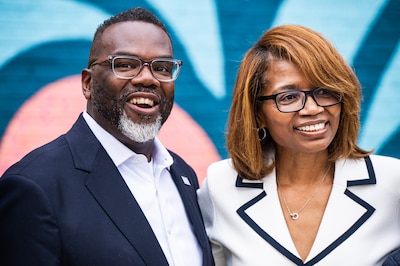
Despite the divisions that have played out in public, several board members pointed to a handful of issues they’ve agreed on, including ensuring the next schools CEO has a superintendent’s license — and sticking to that goal even after Harden reportedly wanted Johnson’s chief of staff to be considered for the job. They also supported establishing a Black Student Success Plan committee and unanimously passed the new CTU contract.
Multiple board members expressed frustration that they haven’t been able to dig more into education policy, and said many members agree on wanting to center the needs of children. Their disagreements are rooted in how to pay for things.
“It’s been about the money since we came on,” elected board member Therese Boyle said in an interview weeks before the budget vote. “The money is why the original board stepped down; the money is why Pedro [Martinez] had to go; it’s about the money now.”
Most board members interviewed said it’s difficult to have robust discussions with more of their colleagues because of the size of the board. They said it’s difficult to coordinate schedules, and additionally, board members can’t meet or talk in groups of six or more without providing notice of an official meeting, in order to comply with the Illinois Open Meetings Act.
That law is meant to ensure public bodies don’t conduct business in secret. But in practice, some board members argued, it means that by the time they get to a public meeting where the entire board can debate an issue, they’re sometimes already facing a vote. By then, they say, many board members have made up their minds.
Multiple board members also said they’ve tried to work with people they don’t typically align with. Boyle and appointed member Debby Pope, who have voted differently on some hot issues, both said they work well together on special education issues.
During the pension dispute this spring, appointed member Ed Bannon reached out to elected member Che “Rhymefest” Smith, who had signed the letter opposing it, to better understand his view, Bannon said. The two had a “great” discussion about the issues they could collaborate on, such as getting more parents involved in CPS, Bannon said. Smith confirmed the account.
“I do try to reach out to people I disagree with,” Bannon said. “I’m not saying I’m a saint about it and I do it all the time or that I’m expressing myself all the time to all these people, but I hope people think I’m making an effort.”
Who do Chicago school board members answer to?
Many board members said major interest groups and unions, as well as parents, push them on many issues, such as special education services, charter schools, and labor matters.
When asked if they felt pressure from any one group or person, including the mayor’s office, to vote a certain way, no one said yes.
In politics, money often translates into influence. Now, in Chicago, money can be spent on directly backing board members. More than $13 million was spent on Chicago school board races last fall. The top spenders, apart from candidates’ direct spending, were the Chicago Teachers Union’s political action committees, followed by two school choice PACs, the Illinois Network of Charter Schools and Urban Center.
“It’s politics now. There’s factions,” said appointed board member Michilia Blaise, a longtime political consultant who served on the city’s last fully appointed board but also ran against Jitu Brown in the last election before dropping out. “There’s people who have to, like, take care of people who gave them money for their campaigns. It’s people positioning themselves for whatever they’re gonna do later.”
On hot button issues, board members have often voted in line with those who supported their campaigns or appointed them. Of the seven board members who opposed CPS’s budget, six, including Blaise, were mayoral appointees.
On a resolution aiming to increase oversight of charter schools, five elected members abstained. Of those, two — Carlos Rivas and Gutierrez — were endorsed and got campaign donations from the Illinois Network of Charter Schools, which opposed the resolution. The other three abstentions were Ellen Rosenfeld, Smith, and Boyle.
But board members have also broken ranks with their supporters or voted in surprising ways.
Custer was endorsed by the CTU during the election but has not voted in line with the union on some major issues, such as the Acero closures or in favor of a short-term loan.
Blaise proposed extending the renewal term for West Side charter school North Lawndale College Prep, which is in her district, for one year longer than what CPS proposed. Blaise was appointed by the mayor, who has been critical of charters in the past.
Charters make up about a quarter of the 105 schools in District 5, which Blaise and Brown represent.
Brown, who is also an ally of the mayor, is known for his decades of advocacy opposing the expansion of charter schools and the closure of neighborhood schools. He voted in favor of the resolution to tighten oversight on charters. But he also supported the renewals of a slew of charter schools in the spring, including Blaise’s proposal to lengthen the renewal term for North Lawndale College Prep.
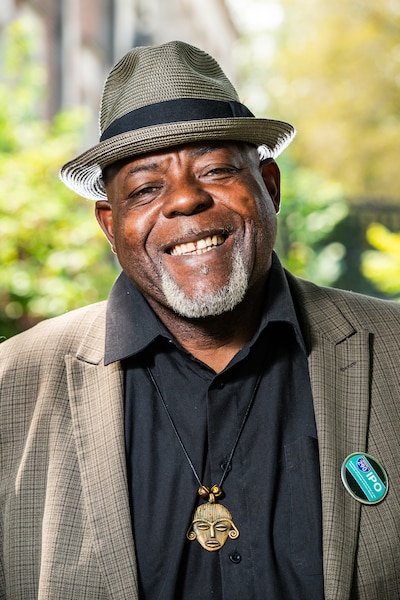
“I have to get over my disdain for the charter industry,” Brown said. “I went to a few charter schools that were clearly schools that were doing the right thing, and I will support those schools, because at the end of the day [I ask], are you doing right by children?”
Appointed members said they don’t feel undue pressure from the mayor’s office to vote a certain way.
Still, elected member Rosenfeld, who represents wealthier North Side neighborhoods of Lake View and Lincoln Park, said the hybrid structure of the board “is a bit of a problem.” She said she knows her votes won’t make everyone happy, but her decisions are based on public feedback. When she considers how appointed members vote, “It’s like, is that how you really feel, or is that how somebody who appointed you told you to feel?”
More Chicago school board elections coming in 2026
Boyle represents part of District 9, including South Side neighborhoods with high voter turnout. The retired school psychologist said she can no longer go on her weekly trip to her neighborhood grocery store without someone recognizing her, which she credits, in part, to two old billboard ads with her face on them.
People have stopped her to talk about special education, the budget, and the former CEO, she said.
“Now I put on a little makeup before I go,” Boyle said, laughing.
Other board members, however, are working to introduce themselves to more people.
Zaccor, who ran unsuccessfully for the board last fall and was instead appointed by the mayor, said she knocked on neighbors’ doors this summer to ensure people know she’s their representative. Zaccor said she’s “probably” running again.
Rios-Sierra, who spent years working for a community organization, said she feels like a political “nobody” and wants to gain recognition.
“I think for me, it’s been a little bit of invisibility still,” she said. “I feel like I should take a little bit more time to get out there and connect with people and do my rounds and really have people see me and understand that I listen and that I can be of service.”
Nine of the 15 current board members Chalkbeat spoke with said they plan to run in next year’s school board elections: elected members Biggs, Boyle, Custer, DeBerry, Gutierrez, Lopez, and Rosenfeld, as well as appointed members Blaise and Bannon.
Another five — elected member Brown and appointed members Zaccor, Rios-Sierra, Pope, and Cydney Wallace — said they’re considering it. School board President Harden and former board member Thomas both said they will not run in 2026.
Wallace, a working mother of four, said she wants to see what kind of “grassroots help” she can get for a potential campaign.
“If I were to run, and my neighbors decided they didn’t want me on the board anymore, obviously I’d be bummed that I lost, but it would be like, ‘Oh no, not all of this free time and not doing all of this work for no money! Whatever will I do?’” Wallace said, laughing.
Reema Amin is a reporter covering Chicago Public Schools. Contact Reema at ramin@chalkbeat.org.

